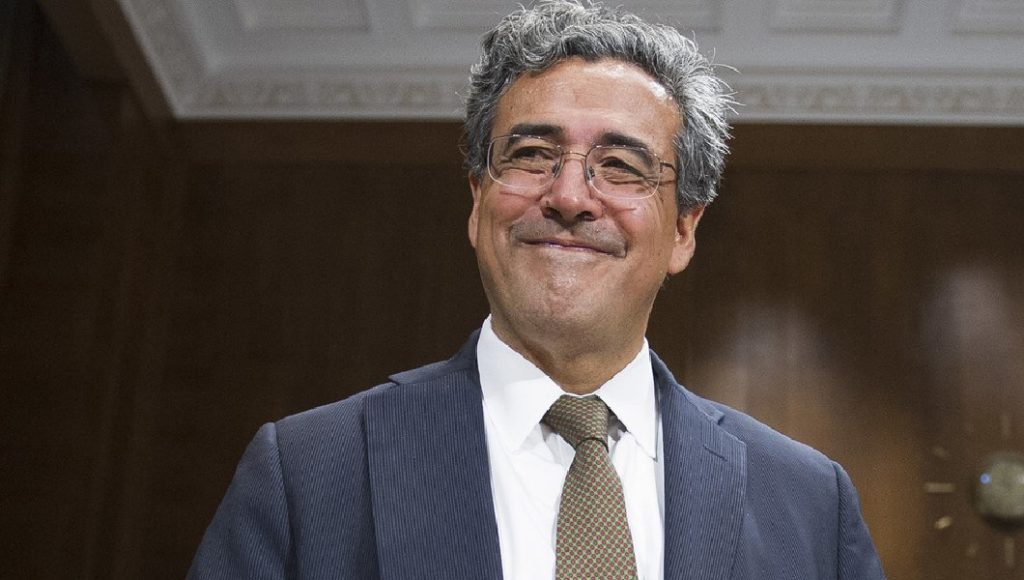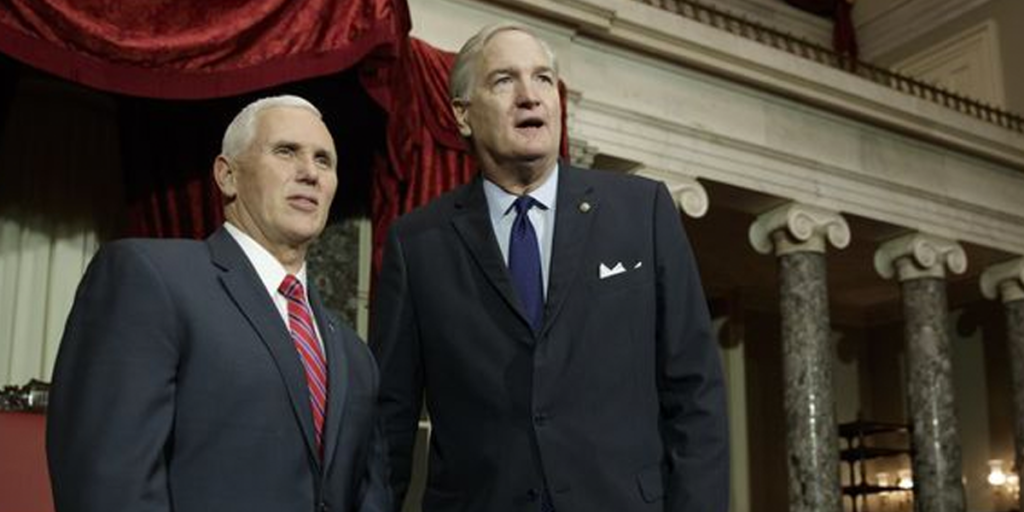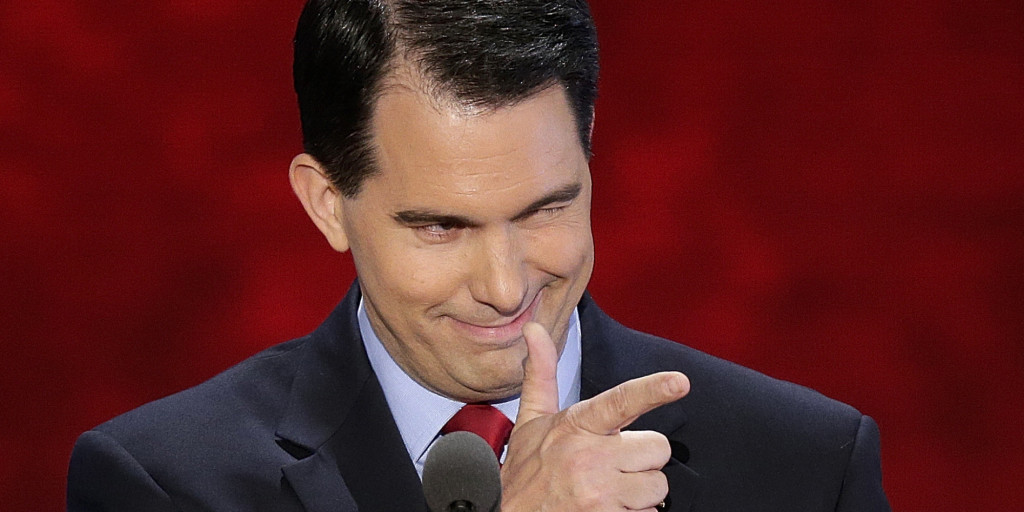Senate confirms Donald Trump pick for solicitor general

The Senate has confirmed President Donald Trump‘s nominee for solicitor general. The vote was 50-47 for Noel Francisco, a former clerk to the late Supreme Court Justice Antonin Scalia. Francisco has served as the principal deputy solicitor general since January of this year. The solicitor general is the top legal advocate for the government, arguing cases before the Supreme Court. The high court opens its term in two weeks, on Oct. 2. Francisco represented former Virginia Gov. Bob McDonnell when he challenged his 2014 conviction for violating federal bribery law by accepting gifts from a wealthy businessman. The Supreme Court unanimously overturned the conviction. Francisco served as associate counsel to President George W. Bush from 2001 to 2003. Republished with permission from the Associated Press.
Kim Jong Un gets Donald Trump’s latest nickname: Rocket Man

With President Donald Trump, a good enemy deserves a good nickname. In his debut appearance before the U.N. General Assembly Tuesday, Trump embraced his latest label – calling North Korean leader Kim Jong Un “Rocket Man.” An apparent reference to the Elton John song, which Trump sometimes played at campaign rallies, “Rocket Man” is the latest Trump-nickname to enter his colorful lexicon. During the 2016 race, he battled with Sen. Marco Rubio (“Little Marco”), Sen. Ted Cruz (“Lyin’ Ted”) and former Secretary of State Hillary Clinton (“Crooked Hillary”). “Rocket Man is on a suicide mission for himself,” said Trump as he addressed the General Assembly. He previously used “Rocket Man” on Twitter Sunday. Trump’s mockery of the dictator quickly became a trending topic on Twitter, where users shared memes of Kim sitting at a piano wearing the oversized sunglasses that were part of John’s signature look in the 1970s. Others shared images of Kim riding a missile like a horse. One Twitter user noted that The Economist magazine used the term to describe Kim’s father on a 2006 cover. Representatives for John did not immediately respond to requests for comment. The song “Rocket Man” was on Elton John’s 1972 album “Honky Chateau.” Trump enjoyed playing the song at his rallies, as well as another Elton John hit “Tiny Dancer.” But John’s team made clear that he had not given permission to Trump to use the music. And in an interview with The Guardian in February 2016, John said: “I don’t really want my music to be involved in anything to do with an American election campaign. I’m British.” John added: “I’ve met Donald Trump, he was very nice to me, it’s nothing personal, his political views are his own, mine are very different, I’m not a Republican in a million years.” After his election last year, a member of Trump’s transition team said John would perform at the inauguration. But the musician’s team quickly shot down the report. Republished with permission from the Associated Press.
Mike Pence to campaign for Luther Strange on Monday

The day before Alabamians head to the polls to vote in the U.S. Senate special election primary runoff, Vice President Mike Pence will make an appearance in the Yellowhammer State on Monday where he will campaign on behalf of Sen. Luther Strange. According to POLITICO, “Pence will headline a get-out-the-vote rally for Strange,” in Birmingham, Ala. “Pence’s appearance underscores the last-minute boost the White House is trying to give Strange in a race where most recent polls have shown him trailing Moore.” The time and location of the event has yet to be made public. Pence endorsed Strange back in August ahead of the primary election. Luther Strange has stood shoulder-to-shoulder with President @realDonaldTrump and is supporting our agenda to #MAGA ?? https://t.co/D2PKz1sFcL — Mike Pence (@mike_pence) August 15, 2017 His visit follows President Donald Trump, who will be in Huntsville on Friday, previously scheduled for Saturday, to also stump for Strange. Strange faces former Ala. Chief Justice Roy Moore in the primary runoff election to decide the GOP nominee for the rest of Jeff Sessions’ Senate term. The winner faces Democratic nominee Doug Jones on the Dec. 12 general election.
Facebook may be facing an ‘era of accountability’

The problems keep piling up for Facebook, and it’s unclear how long the internet giant will be able to brush them aside as it barrels toward acquiring its next billion users. The world’s biggest social network has unwittingly allowed groups backed by the Russian government to target users with ads. That’s after it took months to acknowledge its outsized role in influencing the U.S. election by allowing the spread of fake news – though before news emerged that it let advertisers target messages to “Jew-haters.” Now Facebook is under siege, facing questions from lawmakers and others seeking to rein in its enormous power. The company has turned over information on the Russia-backed ads to federal authorities investigating Russian interference in the U.S. presidential election. Critics say the company also needs to tell its users how they might have been influenced by outside meddlers. Speculation is rife that Facebook executives, perhaps including CEO Mark Zuckerberg, could be called to testify before Congress. Hearings might lead to new regulations on the company. “Facebook appears to have been used as an accomplice in a foreign government’s effort to undermine democratic self-governance in the United States,” writes Trevor Potter, former chairman of the Federal Election Commission and now head of a nonpartisan election-law group, in a letter to Zuckerberg. “ERA OF ACCOUNTABILITY” Potter’s group, the Campaign Legal Center, wants Facebook to make the Russian-sponsored ads public. The company has so far declined to do so, citing the ongoing investigations. It has provided the ads and other information to Robert Mueller, the special counsel in charge of the Russia investigation, Facebook said in a statement, although it declined to elaborate. The company that nudges its users to reveal intimate details about their lives, it turns out, isn’t all that comfortable doing the same. That’s true for everything from the secret algorithms that recommend “people you might know” to data on its attempts to clamp down on the spread of false news shared across its network. The company justifies its secrecy in many ways, having variously claimed legal restrictions, business secrets, security and privacy protections to excuse its opacity. But Jonathan Albright, whose late 2016 research on the “fake news” propaganda ecosystem outlined how propaganda websites track and target users, thinks the current moment may be a turning point for online giants like Facebook. “Now that it has run directly into something that possibly affected the outcome of the election – but they can’t determine how – this may be their era of accountability,” said Albright, the director of research at the Tow Center for Digital Journalism at Columbia University. There has been no other company on the planet, Albright added, that can provide access to as many real people as Facebook. POWER GAMES AND NEW RULES Facebook prefers to think of itself as an online platform, but in many respects it’s also a modern sort of media company, if for no other reason than that so many people rely on it as a source of news and information. In its early years, Facebook even described itself as a “social utility.” Now the question is whether it should be regulated as one – and if so, how. There aren’t many straightforward answers, even where political ads already subject to government rules are concerned. It’s already illegal for foreign nationals to spend money in connection with a U.S. federal election, whether on or off of Facebook. And campaign law requires people who spend money on another person’s website to disclose that fact in the ad itself. Broadcast-era election law, however, can be a poor fit for the Internet Age. Attempts to sway political sentiment on Facebook can be targeted to small groups who share a common background or attitudes, making them difficult to track from the outside. And many such efforts might not resemble traditional advertisements at all. The goal of many Facebook marketing campaigns is to generate posts that regular people will spread widely for free; political persuasion campaigns can work the same way. “As a practical matter, it is extremely difficult for the U.S. government to regulate content on the internet that may have an effect on the U.S. election,” said Nathaniel Persily, a professor at Stanford Law School. “If a teenager in his mother’s basement in Moscow wants to put up a YouTube video, it’s not clear what the U.S. will be able to do about that.” Difficult doesn’t mean impossible. Persily, for instance, thinks that Facebook could use its AI technology to flag election-related ads that don’t bear the disclosures required by existing law. Companies like Facebook could also be required to do some kind of due diligence on who is spending money on their platforms on behalf of candidates, he added. Keeping an online repository of all candidate-related ads within six months of an election, identified by their backers, could also provide an additional check on illegal attempts to sway elections. Republished with permission from the Associated Press.
GOP governors get into the ‘news’ business

Republican governors are getting into the “news” business. The Republican Governors Association has quietly launched an online publication that looks like a media outlet and is branded as such on social media. The Free Telegraph blares headlines about the virtues of GOP governors, while framing Democrats negatively. It asks readers to sign up for breaking news alerts. It launched in the summer bearing no acknowledgement that it was a product of an official party committee whose sole purpose is to get more Republicans elected. Only after The Associated Press inquired about the site last week was a disclosure was added to The Free Telegraph’s pages identifying the publication’s partisan source. The governors association describes the website as routine political communication. Critics, including some Republicans, say it pushes the limits of honest campaign tactics in an era of increasingly partisan media and a proliferation of “fake news” sites, including those whose material became part of an apparent Russian propaganda effort during the 2016 presidential campaign. “It’s propaganda for sure, even if they have objective standards and all the reporting is 100 percent accurate,” said Republican communications veteran Rick Tyler, whose resume includes Ted Cruz‘s 2016 presidential campaign. The website was registered July 7 through Domains By Proxy, a company that allows the originators of a website to shield their identities. An AP search did not find any corporate, Federal Election Commission or IRS filings establishing The Free Telegraph as an independent entity. As of early Monday afternoon, The Free Telegraph’s Twitter account and Facebook page still had no obvious identifiers tying the site to RGA. The site described itself on Twitter as “bringing you the political news that matters outside of Washington.” The Facebook account labeled The Free Telegraph a “Media/News Company.” That’s a contrast to the RGA’s Facebook page, which is clearly disclosed as belonging to a “Political Organization,” as is the account of its counterpart, the Democratic Governors Association. RGA Chairman Scott Walker, governor of Wisconsin, deferred questions through a spokesman to the group’s national staff. At RGA, spokesman Jon Thompson said the site is “just another outlet to share those positive results” of the GOP’s 34 Republican governors. It’s not unprecedented for politicians to try their hand at news distribution. President Donald Trump‘s daughter-in-law, Lara Trump, hosted “real news” video segments in the summer, posted to the president’s Facebook page. In one typical segment she told viewers she wanted to highlight “all the accomplishments the president had this week because there’s so much fake news out there.” Vice President Mike Pence, when he was Indiana governor, pitched the idea of a news agency run by state government, but he ditched the idea in 2015 after criticism. In both cases, however, Lara Trump and Pence were not aiming to hide the source of the content. But the RGA site has Democrats, media analysts and even some Republicans crying foul. Democrats say Republicans are laying the groundwork with headlines that will appear in future digital and television ads, while also providing individual voters with fodder to distribute across social media. “They’re just seeding the ground,” said Angelo Carusone, who runs Media Matters, a liberal watchdog group. “They are repackaging their opposition research so it’s there as ‘news,’ and at any moment that publication could become the defining moment of the narrative” in some state’s campaign for governor. Political communications expert Kathleen Hall Jamieson, a University of Pennsylvania professor who has studied political advertising for four decades, said The Free Telegraph commits a form of “identity theft” by “appropriating the integrity of news” because “the form of news carries credibility” that blatantly partisan sites do not. Jamieson was particularly critical of RGA’s initial failure to disclosure its involvement. “What we know about audiences is they factor in the source of information when judging that information,” she said. “If you are denying the reader, the listener or the viewer information you know the reader uses, the question is why do you feel the need to do this?” A recent RGA fundraising email said the site was “fact-checking the liberal media” and is a counter to “decades of demonizing Republicans.” Playing off President Donald Trump’s dismissal of “fake news,” the email said media “can say whatever they like about us – whether it’s true or not.” Some of The Free Telegraph’s content plays off of material from traditional media organizations and from right-leaning outlets such as The Daily Caller. RGA press releases are linked. Some headlines and photos are exact duplicates of RGA press releases. In the days after Hurricane Harvey made landfall in Texas and Louisiana, the site included headlines praising Texas Gov. Greg Abbott, a Republican, for his response. There were no such headlines for Louisiana Gov. John Bel Edwards, a Democrat. The content is far tamer than from some sites from that popped up during the 2016 presidential campaign to propagate sensational but baseless stories. But it does create a cache of headlines that could turn up in campaigns. The first test is in this fall’s Virginia governor’s race pitting Democratic nominee Ralph Northam against Republican Ed Gillespie. Virginians already have seen another site, The Republican Standard, that is run by Virginia Republican operatives with ties to Gillespie, a former state and national party chairman, and to a firm that has been paid by the RGA. The Free Telegraph and its social media accounts frequently link The Republican Standard. Northam campaign spokesman David Turner accused Gillespie and Republicans of “creating their own Pravda,” a nod to the official newspaper of the Communist Party of the Soviet Union. The Gillespie campaign declined comment, referring questions back to the RGA. Republished with permission from the Associated Press.
US Navy fires 2 commanders in connection with ship collisions

The U.S. Navy has fired two senior commanders in the Pacific region in connection with recent deadly collisions of Navy ships, as part of a sweeping purge of leadership in the Japan-based fleet. The announcement comes a day before the top U.S. Navy officer and the Navy secretary are scheduled to go to Capitol Hill for a hearing on the ship crashes. Vice Adm. Phil Sawyer, commander of the Navy’s Japan-based 7th Fleet, fired Rear Adm. Charles Williams and Capt. Jeffrey Bennett, citing a loss of confidence in their ability to command. Williams was the commander of Task Force 70, which includes the aircraft carriers, destroyers and cruisers in the 7th Fleet, and Bennett was commander of the destroyer squadron. Last month, Vice Adm. Joseph Aucoin, who previously led 7th Fleet, was relieved of duty. The USS John S. McCain and an oil tanker collided in Southeast Asia last month, leaving 10 U.S. sailors dead and five injured. And seven sailors died in June when the USS Fitzgerald and a container ship collided in waters off Japan. The latest dismissals bring the number of fired senior commanders to six, including the top three officers of the Fitzgerald. Navy Capt. Charlie Brown said Monday that 7th Fleet ships have completed the one-day operational pause ordered for the entire Navy to make sure crews were conducting safe operations. And Pacific Fleet is in the process of carrying out a ship-by-ship review of its vessels, looking at navigation, mechanical systems, bridge resource management and training. Rear Adm. Marc Dalton is now commander Task Force 70, and Capt. Jonathan Duffy, who was deputy commander of the destroyer squadron, took over as commander. Republished with permission from the Associated Press.


